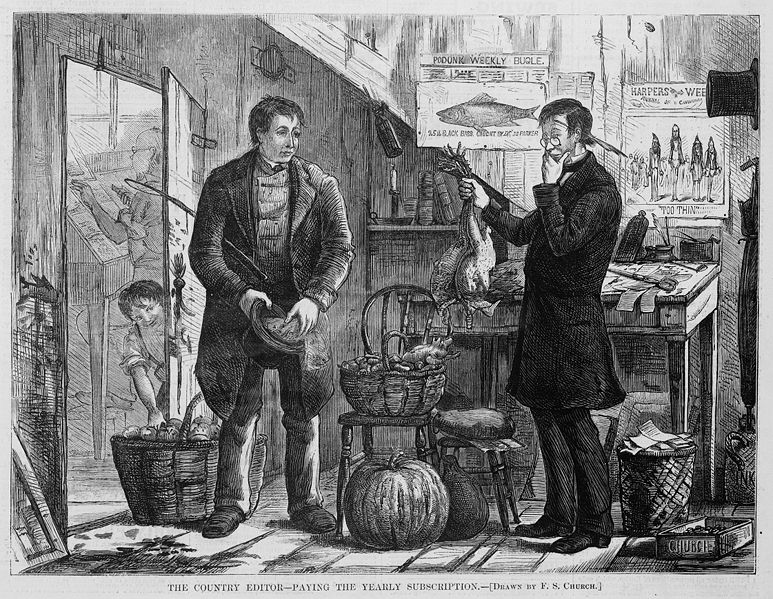Then it was Vex's turn to get pissed off and melodramatic, so they started loudly proclaiming that the vandalism was a violation of their First Amendment rights to anyone who would listen.
All of which annoyed me in about a million different ways, so I started writing about it, but realized that it was actually so obnoxious that I couldn't even muster a real post, so here's what I have to say in lazy-blogger bullet-point-list style:
- The cover was lame. In response to the city's decision not to sell Congress Square to the Eastland hotel, they made a typically barf-tastic comic illustration of a scale with a drunk homeless bottle collector on one side (the weighted side) and a carpenter, businessman, and waitress on the other with the headline, "PORTLAND POLITICIANS PREFER BUMS OVER JOBS." Maybe it's the nature of the format or maybe Mort Todd and company are just looking to get a cheap rise out of people, but it's pointless and reductive to pretend that anyone thinks Congress Square is just fine the way it is. It's gross and kind of scary sometimes, but giving up already-limited public space for a ballroom/convention center when we're already building a huge complex on Thompson's Point and renovating the Civic Center is one of the dumbest solutions to the problem.
- The Occupy response was lame. I think it's awesome when people are passionate about a cause and take action in support of it, but not all action is created equal. What was the intended audience for this particular stunt? Presumably people who are either on the fence about the ballroom thing or think it's a reasonable idea. What was the intended effect? Presumably to sway those people to support your position. So did anyone involved really think that the punked out guerrilla 'zine approach was going to win friends and influence people? Anyone who thought the city missed an opportunity by denying the sale is way more likely to see it as a bunch of disgruntled, unemployed hippies trying ineffectively to stick it to the man, identify with the man, and become even less likely to support discussions about creative, progressive uses of the space.
- Okay, free speech, for crying out loud? Nice try, but the argument wasn't silenced. The majority of the drawing and the headline remained intact and the argument easily identifiable. Vex got its point across. I'd be with them on this one if the issue hadn't been recirculated at all (they do allege that some number appear to have gone missing) but that wasn't the case. As Todd noted in this week's edition, the number "missing" would have marked a jump in circulation if they went out legitimately, which means they didn't expect that many to be picked up by readers anyway. It's likely that there was an issue, albeit modified, available to anyone who cared to have one. I worked at the USM Free Press when Sigma Nu followed the circulation vehicle and removed every copy of the paper from both campuses in order to suppress bad publicity for a sorority: that was arguably the squelching of free speech. As for whether you can steal something that's given away free, an argument people sympathetic to the vandals have made, the FP introduced language in the masthead limiting the number per "customer." It's virtually unenforceable, but it does offer protection if someone makes off with all of them. Which didn't happen here, but if I were Vex, I'd prepare for that possibility.
- As I mentioned right out of the gate, no one's taking credit for these shenanigans. So again the question of intended consequences comes up. If you're trying to convince people of the righteousness of your cause, and insist that you've done nothing inappropriate, acting like furtive weirdos might not be the most effective route. I doubt very much that this was ever about the actual issue at hand. It looks very much like someone taking a swing at Vex because they find them intolerable and not very much like an earnest attempt to communicate.
- As ludicrous as I find Mort Todd's free speech complaint, Rob Korobkin (author of the inserted essay but not, he says, the mastermind behind this escapade)'s attempt to claim that this wasn't vandalism is equally laughable. The aforementioned mastermind(s?) may not have obscured Vex's message, but they did mischievously and maliciously alter it. That's vandalism.
To be clear, I'm philosophically with the Save Congress Square crowd and was a believer in the Occupy movement. One of the most effective aspects of early Occupy was its insistence on making radical thinking and participatory, direct democracy accessible to people who might be alienated by the angry-punk image of G8 protesters: The message didn't change, the approach did and it succeeded in drawing a stronger, wider base than any protest movement in recent history. Watching that good will squandered on what appears to be a petty personal beef is quite sad.
I think Vex's approach to the homeless, many of whom are mentally ill and/or badly substance-addicted is callous and inhumane. I find much of the content of the magazine at large childish and distasteful. It's unclear to me whether Mort Todd's intention is to talk meaningfully about ideas or just fuck around indulging a snide and vaguely fratty sense of humor. Hopefully it's the second, because at least he's succeeding there. Either way, I avoid it, because the result is distasteful to me.
But in this case, everyone's behaving badly. As much as both sides want to pretend this spat is about some universal, more meaningful issue, it's just schoolyard dust-up that ends up making everyone involved look small.

